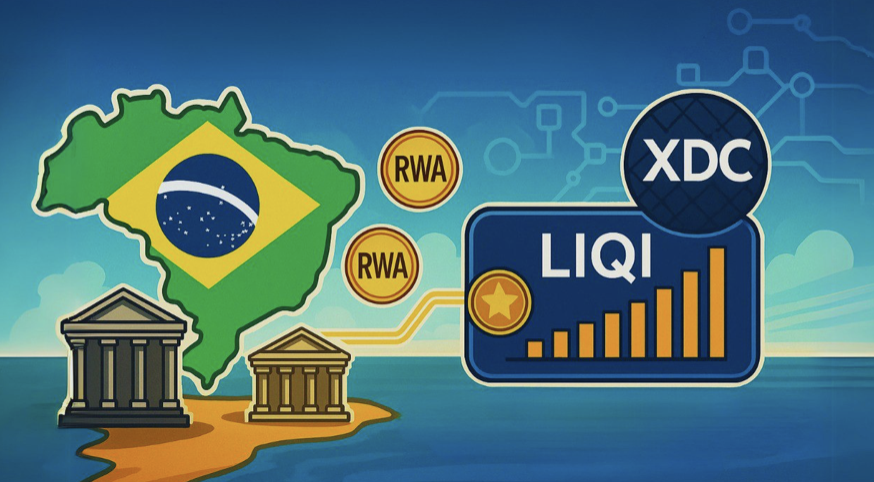An exciting revolution is taking place in the heart of São Paulo, Brazil, one set to ripple through global finance. At the intersection of traditional financial structures and cutting-edge blockchain technology, two key players are merging forces: LIQI, a trailblazing Brazilian fintech, and the XDC Network, a next-generation blockchain infrastructure built for real-world assets (RWAs).
They aim to tokenize $500 million in assets, positioning Brazil as a central hub in the rapidly expanding global tokenization market.
A Partnership With Global Implications
The collaboration between LIQI and XDC Network isn’t just another tech tie-up; it’s a blueprint for how emerging markets can leapfrog into the future of finance. As global interest in real-world asset tokenization grows, this partnership exemplifies how local innovation, backed by global tech, can democratize access to capital, streamline asset issuance, and connect emerging economies with institutional-grade blockchain networks.
Set to launch its first issuance within the next 90 days, the initiative is being hailed as one of the largest institutional tokenization projects in Latin America. It’s not just about the numbers; it’s about the shift in mindset and infrastructure. “We are connecting Brazil to the global flow of RWAs,” said Daniel Coquieri, CEO of LIQI, capturing the ambition behind this groundbreaking project.
Brazil: From Emerging Market to Innovation Epicenter
Brazil has long been seen as a country of great financial potential, but recent regulatory developments and a tech-savvy population are pushing it to the forefront of financial innovation. According to a projection by Bank of America, the RWA market could surpass $16 trillion by 2030. With its evolving regulatory clarity, abundant natural and financial resources, and increasingly digital economy, Brazil is poised to be a leader in this shift.
LIQI has been a vanguard in this movement. Since its founding in 2021, the company has attracted substantial investments from influential backers, including Kinea Ventures (of Itaú Unibanco), Oliveira Trust, and Honey Island by 4UM. With a robust track record that includes the launch of Brazil’s first tokenized investment in credit rights (TIDC) and partnerships with traditional institutions like Banco BV and Itaú, LIQI has proven it can bring institutional credibility to blockchain innovation.
The Role of the XDC Network
On the technology side, the XDC Network brings maturity to the equation. A Layer 1 blockchain explicitly designed for institutional applications, XDC is EVM-compatible, uses a delegated proof-of-stake (dPoS) consensus model, and boasts transaction speeds in seconds with negligible fees.
But beyond its technical capabilities, what makes XDC especially compelling is its institutional pedigree. The network adheres to key global standards like ISO 20022 and MLETR, making it suitable for high-stakes sectors such as cross-border payments, trade finance, and tokenized securities. Its affiliations with the International Trade and Forfaiting Association (ITFA), and involvement in global efforts like the TFD Initiative reflect its commitment to becoming the go-to blockchain infrastructure for real-world applications.
According to Diego Consimo, Head LATAM at XDC Network, “LIQI is one of the most prepared platforms in Latin America for regulated RWA issuance. With this partnership, we are strengthening XDC as the reference infrastructure for financial applications backed by real assets, with global liquidity and on-chain execution.”
Tokenization With Purpose
The LIQI-XDC initiative aims to issue tokenized representations of real assets, such as corporate debt, receivables, private credit, agribusiness financial instruments, and real estate. The model doesn’t just replicate traditional structures; it enhances them. Using validated legal frameworks already compliant with Brazilian regulations, these digital tokens provide greater liquidity, transparency, and accessibility than their paper-based counterparts.
Tokenization offers a more modern and inclusive alternative to traditional vehicles like FIDCs (Receivables Investment Funds). This means that small to mid-sized enterprises, historically underserved by Brazil’s capital markets, could gain broader access to investment through blockchain while maintaining regulatory integrity.
Local Foundations, Global Vision
While the initial focus will be on the Brazilian market, the vision is undeniably global. LIQI’s issuances have the potential to circulate in a much broader financial environment by using the XDC Network’s international infrastructure and tapping into its ecosystem of partners, including Securitize, Archax, SBI Holdings, and Mercado Bitcoin.
This local-to-global scope is critical. It allows for financial products that are both culturally and economically tailored to local conditions but engineered for global reach. Such a model doesn’t just transform capital markets in Brazil, it sets a precedent for how other emerging markets might scale innovation responsibly.
Challenges and Opportunities
Of course, the road ahead isn’t without challenges. Regulatory uncertainties, market education, and technological adoption hurdles remain. However, the synergy between LIQI and XDC, a fintech rooted in the nuances of the Brazilian economy and a blockchain network built for cross-border compliance, suggests a uniquely powerful combination to tackle these issues.
There’s also an opportunity to shape best practices. With both companies investing in infrastructure, compliance, and education, they are not only scaling a business model but also influencing policy discussions and market standards.
The Global Implication of a Local Breakthrough
What’s happening in São Paulo isn’t just a regional innovation. It’s the beginning of a global shift in how we issue, move, and manage value. By blending traditional finance’s thoroughness with blockchain’s speed and transparency, LIQI and XDC are setting a new standard.
From the heart of Brazil to the global stage, they’re proving that the future of asset issuance isn’t coming someday. It’s already being built one token at a time.
Disclaimer: This article is provided for informational purposes only. It is not offered or intended to be used as legal, tax, investment, financial, or other advice.

